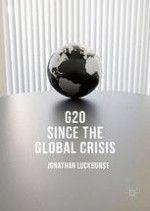2016 | OriginalPaper | Buchkapitel
4. International Focus on the G20
verfasst von : Jonathan Luckhurst
Erschienen in: G20 Since the Global Crisis
Verlag: Palgrave Macmillan US
Aktivieren Sie unsere intelligente Suche, um passende Fachinhalte oder Patente zu finden.
Wählen Sie Textabschnitte aus um mit Künstlicher Intelligenz passenden Patente zu finden. powered by
Markieren Sie Textabschnitte, um KI-gestützt weitere passende Inhalte zu finden. powered by
